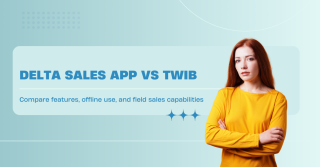Enhancing Territory Management In The Lubricant Industry

Effective territory management is crucial for success in the lubricant industry. With a highly competitive market and a diverse range of products catering to different industries, optimizing sales territories ensures maximum coverage, improved customer relationships, and higher profitability.
This blog explores key strategies to enhance territory management for lubricant sales teams.
Why Territory Management Matters in the Lubricant Industry
Territory management is essential in the lubricant industry because it directly impacts sales efficiency, customer satisfaction, and overall business growth. A well-structured territory plan ensures that sales teams operate efficiently and that no potential opportunities are overlooked. Properly managed territories allow sales teams to:
1. Maximize Market Coverage
Strategically dividing sales territories helps ensure that all potential customers are reached efficiently. Without a structured approach, some areas may be overserved while others are neglected, leading to lost sales opportunities.
2. Improve Customer Relationships
A defined sales territory enables representatives to build strong, long-term relationships with customers. Regular interactions foster trust and allow for better service, leading to higher customer retention and loyalty.
3. Enhance Sales Team Productivity
Reducing unnecessary travel and administrative tasks allows sales reps to focus on engaging with customers and closing deals. Optimized territories ensure that workloads are evenly distributed and that reps are not overburdened.
4. Increase Revenue and Profitability
Focusing resources on high-value accounts and well-defined territories ensures better resource allocation, leading to increased sales and profitability.
5. Stay Competitive
A well-managed territory enables companies to respond faster to market changes, competitive pressures, and customer demands, keeping them ahead of the competition.
Understanding the Challenges in Lubricant Sales Territories
Lubricant sales teams face unique challenges, including:
Expansive and Varied Customer Base
Lubricants cater to multiple industries such as automotive, manufacturing, construction, agriculture, and marine. Each sector has different requirements, making it crucial to tailor sales approaches accordingly.
Geographical Coverage
Reaching customers in remote or dispersed locations requires strategic planning and optimized sales routes to ensure efficient service and delivery.
Competitive Market
With numerous brands competing for market share, differentiation and customer retention are significant challenges. Companies must develop strong value propositions and superior customer service strategies.
Frequent Product Innovations
New formulations and specifications are frequently introduced to meet environmental regulations and industry standards. Keeping sales teams updated on these changes is crucial for effective selling.
Strategies for Effective Territory Management
1. Data-Driven Territory Planning
Using sales data and customer insights helps in mapping territories based on demand potential, competitor presence, and logistics feasibility. A well-defined territory plan ensures balanced workloads and reduces overlapping efforts.
2. Segmenting Customers for Better Targeting
Not all customers have the same needs. Segmenting them based on factors such as industry, purchasing volume, and frequency helps in creating personalized sales strategies.
3. Optimizing Sales Routes with Technology
Leveraging field sales management software with GPS tracking enables sales reps to plan efficient routes, minimizing travel time and fuel costs while maximizing customer visits.
4. Implementing a Robust CRM System
A Customer Relationship Management (CRM) system centralizes customer interactions, tracks order history, and provides insights into customer preferences. This allows sales teams to engage better and build long-term relationships.
5. Leveraging Digital Tools for Field Sales Automation
Using sales automation tools like the Delta Sales App streamlines order management, inventory tracking, and performance analysis, making sales reps more productive.
6. Performance Monitoring and Continuous Improvement
Regularly analyzing territory performance through KPIs such as sales growth, customer acquisition, and retention rates helps in identifying gaps and improving strategies.
7. Training and Upskilling Sales Teams
Providing continuous training on product knowledge, customer handling, and sales techniques equips the team to handle challenges effectively and close more deals.
Conclusion
Efficient territory management in the lubricant industry requires a blend of data-driven strategies, digital tools, and a customer-centric approach. By optimizing territories, automating sales processes, and enhancing customer engagement, businesses can improve sales performance and gain a competitive edge in the market. Investing in the right technology and continuously refining strategies will ensure sustained growth and success.
FAQs
1. What is territory management in the lubricant industry?
Territory management involves strategically dividing sales regions to ensure efficient coverage, better customer service, and maximized sales opportunities.
2. How can technology improve territory management?
Technology like CRM systems, sales automation tools, and GPS tracking helps streamline operations, optimize sales routes, and enhance customer engagement.
3. What are the key challenges in lubricant sales territory management?
Challenges include vast geographical coverage, diverse customer needs, strong market competition, and frequent product innovations.
4. How does customer segmentation help in territory management?
Segmenting customers based on industry, purchasing habits, and volume allows sales teams to tailor their approach and increase efficiency.
5. Why is continuous training important for lubricant sales teams?
Ongoing training ensures sales reps stay updated on product innovations, customer handling techniques, and industry trends, leading to higher sales effectiveness.
6. How can a lubricant business optimize sales routes?
Using field sales management software with GPS tracking helps sales reps minimize travel time, reduce costs, and maximize customer visits.








